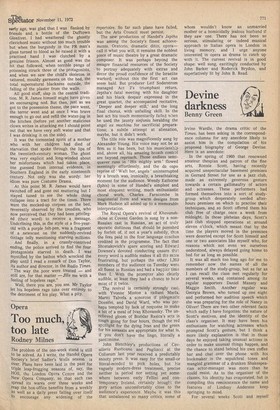Opera
Too much, too late
Rodney Milnes
The problem of the one-week stand is still to be solved. As I write, the Handel Opera Society's brief Sadler's Wells season is over. Plans have been laid in the past for triple leap-frogging seasons of, say, the HOS, the London Opera Centre and the New Opera Company, so that each can Spread its wares over three weeks and reap the box-office benefits from a weekly as well as a daily press falling over itself to encourage any widening of the repertoire. So far such plans have failed, but the Arts Council must persist.
The new production of Handel's Jeptha was among the Society's finest achievements. Oratorio, dramatic ditto, opera— call it what you will, it remains the noblest piece of music theatre by a great dramatic composer. It was perhaps beyond the meagre financial resources of the Society to portray adequately with extras and decor the proud confidence of the Israelite warlord; without this the first act can seem bald. But producer Leif Soderstrom managed Act 2's triumphant return. Jeptha's fatal meeting with his daughter and his black despair expressed in the great quartet, the accompanied recitative, 'Deeper and deeper still,' and the long final chorus, with unfailing skill. In the
last act his touch momentarily failed AN hen he used the jaunty sinfonia heralding the angel ex machina for sacrificial prepara
tions; a subtle attempt at alienation, maybe, but it didn't work.
The title role was magnificently sung by Alexander Young. His voice may not be as firm as it has been, but his musiciansh:p and, above all, his amazing breath control are beyond reproach. Those endless semi quaver runs in 'His mighty arm' flowed seemingly effortlessly, and the da capo reprise of Waft her, angels' uninterrupted by a breath was, ironically, a breathtaking moment for the audience. Wendy Eathorne (Iphis) in some of Handel's simplest and most eloquent writing, much enthusiastic choral work, Charles Farncombe in magisterial form and warm designs from Mark Hudson all added up to a memorable interpretation.
The Royal Opera's revival of Khovanshchina at Covent Garden is sung by a non
Russian cast in Russian, an act of truly operatic dottiness that should be punished by forfeit of, if not a year's subsidy, thzn the fees paid to the four language coaches credited in the programme. The fact that Shostakovich's spare scoring and Edward Downes's devoted conducting ensure the t every word is audible makes it all the more frustrating, but perhaps the other 1,390 members of the audience on Tuesday were. all fluent in Russian and had a happier time than I. With the prompter also clearly audible, at least they had a chance to hear most of it twice.
The revival is certainly strongly cast, with Yvonne Minton a radiant Marfa, Martti Talvela a sonorous if phlegmatic Dossifei, and David Ward, who was perhaps tempted by lack of response to make a bit of a meal of Ivan Khovansky. The un relieved gloom of Bozidar Rasica's sets is tough going for four hours, though the red spotlight for the dying Ivan and the green for his assassin are appropriate for what is, if you don't have the lingo, literally a pantomime.
John Bletchley's productions of Cav alleria Rusticana and Pagliacci at the Coliseum last year received a predictably snooty press. It was easy for the small-or literal-minded to pick holes, but his vaguely modern-dress treatment, precise neither in period nor setting yet some where between early Fellini and contemporary Ireland, certainly brought the gory action uncomfortably close to the audience's experience. Maybe it was this that unbalanced so many critics, some of whom wouldn't know an unmarried mother or a homicidally jealous husband if they saw one. There has not been so serious, stimulating or indeed musical approach to Italian opera in London in living memory, and I urge anyone interested, in opera as drama to catch up with it. The current revival is in good shape: well sung, excitingly conducted by John Barker and Roderick Brydon, and superlatively lit by John B. Read.


















































 Previous page
Previous page